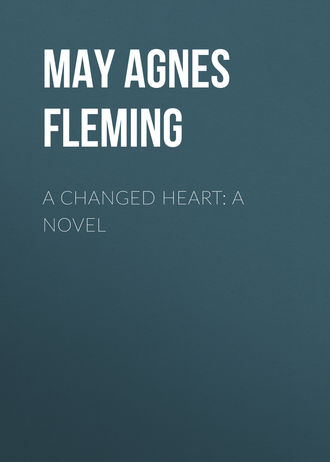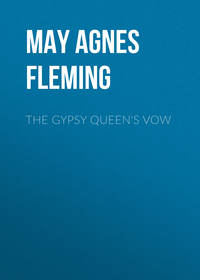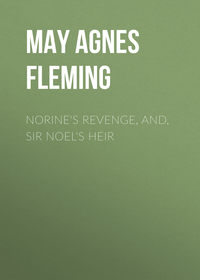 полная версия
полная версияA Changed Heart: A Novel
"On business;" said Captain Cavendish; "that means shopping."
"No, sir, it doesn't; it means something serious, and that you must take share in. You, too, Jeannette, and you, Alick, if we run short."
"Thank you," said Alick, "what is it?"
"Why, you know," began Miss Blair, with the air of one about entering upon a story, "there's that Mrs. Hill – you know her, Alick?"
"What! the wife of the pilot who was drowned in the storm last week?"
"That's the one," nodded Laura. "Well, she's poor – Oh, dear me! ever so poor, and her two children down in the measles, and herself half dead with rheumatism. I shouldn't have known a thing about it only for Miss Rose. I do declare Miss Rose is next door to an angel; she found her out, and did lots of things for her, and told me at last how poor she was, and asked me to send her some things. So then I made up this plan."
"What plan?" inquired Jeannette, as Laura stopped for want of breath, and Nathalie sat listening with an amused look.
"Oh, didn't I tell you? Why, we're going to have a play, and every one of us turn into actors; admission, half a dollar. Won't it be grand?"
"And the play is Laura's own," said Nathalie; "nothing less than the adventures of Telemachus dramatized."
"That is delightful," said Jeannette, with sparkling eyes. "Have I a part, Laura?"
"To be sure, and so has Natty, and myself, and Captain Cavendish, and Val Blake, and Charley Marsh, and as many more as we want. The new wing that pa has built to our house is just finished, and, being unfurnished, will make a lovely theater. Only a select number of tickets will be issued, and the place is sure to be crowded. The proceeds will be a little fortune to Mrs. Hill."
"You should have given Miss Rose a part, as she was the head of it," suggested Alick.
"She wouldn't have it. I tried hard enough, but she was resolute. She is such a timid little thing, you know, and she would make a lovely nymph, too."
"What part have you assigned me?" inquired Captain Cavendish.
"Being a soldier and a hero, you are Ulysses, of course; Charley is Telemachus; Val is Mentor – fancy Val with flowing white hair and beard, like an old nanny-goat. Jeannette, you will be Calypso; Natty will take Eucharis; I, Penelope. I wanted Miss Rose to be Eucharis – the part would have suited her so well."
"I don't believe it would come natural to Charley to make love to her," said Alick; "he'll have to, won't he, if he is Telemachus?"
"You must change the casts, Miss Blair," said the captain, decidedly. "If Telemachus is to do the love-making, I must be Telemachus. Mr. Marsh and I must change."
"You would make such a nice Ulysses," said Laura, meditatingly, while Nathalie blushed; "but please yourself. You must all spend the evening at our house, and when the whole dramatis personæ are gathered, we can discuss and settle the thing for good, fix the rehearsal and the night of the play. Don't fail to come."
"You need not be in a hurry," said Jeannette, as Laura rose and was sailing off; "stay for luncheon."
"Couldn't possibly – promised to leave Natty back safe and sound in an hour, and it only wants ten minutes now. If we fail one second, she will never get off for rehearsals. Remember, you are all engaged for this evening."
The two long parlors of the Blairs were pretty well filled that night with young ladies and gentlemen, and a very gay party they were. There was so much laughing and chaffing over it, that it was some trouble to settle preliminaries; but Laura was intensely in earnest, and could see nothing to laugh at, and Captain Cavendish coming gallantly to her aid, matters were arranged at last. Charley Marsh, who was a Rubens on a small scale, undertook to paint the scenery, superintend the carpenters and the machinery of the stage. The young ladies arranged the costumes; everybody got their parts in MS.; rehearsals were appointed, and some time before midnight the amateurs dispersed. In the June moonlight, the English officer drove Nathalie home, and it was not all theatricals they talked by the way. There was a good deal of trouble about the thing yet, now that it was finally started. In the first place, there was that tiresome Lady Leroy, who made a row every time Natty went to rehearsal, and required lots of strawberries, and jellies, and bottles of old wine, to bring her to reason. Then they bungled so in their parts, and wanted so much prompting, and Miss Elvira Tod, sister to the Rev. Augustus, who was tall and prim, and played Minerva, objected to wearing a tin shield, and wanted to keep on her hoops.
"Now, Miss Tod," expostulated Laura, ready to cry, "you know the goddess Minerva always is painted with a breastplate, to conceal her want of a bust; and as for your skeleton, you would be a nice goddess with hoops – wouldn't you?"
On the whole, things progressed as favorably as could be expected; and the eventful night was announced, tickets were issued and eagerly bought, and Speckport was on the qui vive for the great event. When the appointed night came, the impromptu theater was crowded at an early hour, and with nothing but the upper-crust, either; the military band, which formed the orchestra, played the "Nymph's Dance" ravishingly, and amid a breathless hush, the curtain rose.
Mrs. Hill, the destitute widow, was made happy next day by some twenty pounds, the produce of the play, and Speckport could talk of nothing else for a week. The Speckport Spouter even went into personalities. "Miss Nathalie Marsh," that journal said, "as Eucharis, astonished every one. The fire, the energy, the pathos of her acting could not be surpassed by the greatest professionals of the day. Captain Cavendish, as the hero, performed his part to the life – it seemed more like reality than mere acting; and Mr. C. Marsh as Ulysses, and Miss Laura Blair as Penelope, were also excellent."
On the morning after this laudatory notice appeared in the Spouter, a young gentleman, one of the employees of that office, walked slowly along Queen Street, his hands thrust deep in his coat-pockets, his cap very much on one side of his head, and his face lengthened to preternatural solemnity. The young gentleman was Bill Blair; and that he had something on his mind was evident, for his countenance was seriously, not to say dismally, meditative. Reaching the office, he walked deliberately up-stairs, entered the outer room, swung himself nimbly up on the handiest stool, and began flinging his legs about, without the ceremony of removing his cap. Mr. Clowrie, the only other occupant of the apartment, looked at him over his desk with a frown.
"I thought Mr. Blake told you to be here at half-past six this morning, and now it's a quarter past eight," began Mr. Clowrie; "if I was Blake, I would turn you out of the office."
"But you ain't Blake!" retorted Master Blair; "so don't ruffle your fine feathers for nothing, Jakey! If you had been up till half-past one this morning, perhaps you wouldn't be any spryer than I am."
"What kept you up till that time? Some devilment, I'll be bound."
"No, it wasn't," said Bill; "our folks, the whole crowd but me, streaked off to the theatre; so as I couldn't see the fun of playing Robinson Crusoe at home, I just went over to Jim Tod's to have a game of all-fours, and a look at the pups, and they're growing lovely. I didn't mean to stay long, but some of the rest of the fellows were there, and Jim had a box of cigars, and a bottle of sherry he had cribbaged out of the sideboard, and it was all so jolly I'll be blowed if it didn't strike twelve before we knew where we were."
"Well, now you've come, go to work, or there will be a precious row when the boss comes."
"Blake won't row," said Bill, nodding mysteriously; "but I know where there will be one before long. Cracky, won't there be a flare-up when it's found out!"
Mr. Clowrie laid down his pen and looked up.
"When what's found out?"
"That's my secret," replied Bill, with a perfect shower of mysterious nods. "I saw the rummiest go last night when I was coming home ever you heard tell of."
"I don't believe it," said Jake, disdainfully; "you're always finding mare's-nests, and a lot they come to when all's done!"
"Jake, look here! you won't tell, will you?"
"Bosh! go to work. What should I tell for?"
"Well, then," said Bill, lowering his voice, "I've found out who stole that hundred pounds from old McGregor."
"What?"
"You remember that hundred pounds old McGregor had stole a week ago, and that went so mysteriously? Well, I've found out who took it."
"You have!" cried Mr. Clowrie, excited; "why, there's a reward of fifty dollars out for the thief!"
Bill nodded again.
"I know it, but I ain't going to apply. You won't tell – honor bright!"
"I won't tell! who was it?"
"Don't faint if you can! It was his own son, Alick!"
"Wha-a-t!"
"I tell you it was; I heard him say so myself, last night."
Mr. Clowrie sat thunderstruck, staring. Master Blair went on:
"Charley Marsh is in the mess too – I don't mean about the money-stealing, mind! but him and Sandy McGregor are galloping the road to ruin at a 2.40 rate!"
"What do you mean?"
Bill looked round as if fearful the very walls would hear him.
"They go to Prince Street, Jake! I met them coming out of a certain house there past twelve o'clock last night!"
"By ginger!" exclaimed Mr. Clowrie, aghast. "You never mean to say young McGregor stole the money to gam – "
"Hu-sh-sh! I wouldn't have it found out through me for the world. It's all the work of that dandified officer; he was with them in a long overcoat, but I knew him the minute I clapped eyes on him. They were talking about the bank-note, and the captain was laughing and smoking away as jolly as you please; but I saw Charley's face as they passed a gas-lamp, and I swear he was as white as a ghost!"
"I suppose he'd been losing."
"I reckon so, and Alick didn't look much better. That captain's a regular scape – he's after Cherrie Nettleby as regular as clock-work now."
Mr. Clowrie scowled suddenly, but Bill clattered on:
"I saw him twice last night; once before I met them in Prince Street. It was about nine, and Cherrie was with him. There the two of them were standing, like Paul and Virginny, at the gate, making love like sixty! That Cherrie's the preciousest fool that ever drew breath, I do think. Why don't you – "
He stopped short in consternation, for the door swung open and Val strode in, and, as he had done once before, collared him. With the other hand he turned the key in the lock to keep out intruders, and Bill fairly quaked, for Val's face looked ominous.
"Now, look you, Master Bill Blair," he began, in a tone exceedingly in earnest, "I have been listening out there for some time, and I have just got this to say to you: if ever I find you repeat it to mortal man or woman, as long as you live, I'll break every bone in your body! Do you hear that?"
Yes, Master Bill heard, and jerked himself free with a very red and sulky face.
"Don't forget now!" reiterated Val; "I'll thrash you within an inch of your life, as sure as your name's Bill! And you, Clowrie, if you want to keep yourself out of trouble, take my advice and say nothing about it. Now get to work, you, sir, and no more gossiping."
Val strode off to his own room, and sat down to look over a file of exchanges, and read his letters. But he could neither read nor do anything else with comfort this morning. The boy's gossip had disturbed him more than he would have owned; and at last, in desperation, he pitched all from him, seized his hat, and went out.
"I played Mentor the other night on the stage. I think I'll try it in real life. Confound that Cavendish; why can't he let the boy alone? I don't mind McGregor; he's only a noodle at best, and the old man can afford to lose the money; but Charley's another story! That Cherrie, too! The fellow's a scoundrel, and she's a – ! Oh, here she comes!"
Sure enough, tripping along, her blue parasol up, her turban on, a little white lace vail down, a black silk mantle flapping in the breeze, a buff calico morning-wrapper, with a perfect hailstorm of white buttons all over it, sweeping the dust, came Miss Nettleby herself, arrayed as usual for conquest. The incessant smile, ever parting her rosy lips, greeted Val. Cherrie always kept a large assortment of different quality on hand for different gentlemen. Val greeted her and turned.
"Where are you going, Cherrie?"
"Down to Mrs. Marsh's. I've got a book of hers to return. How's Miss Jo?"
"She's well. I'll walk with you, Cherrie; I have something to say to you."
His tone was so serious that Cherrie stared.
"Lord, Mr. Blake! what is it?"
"Let us go down this street – it is quiet. Cherrie, does Captain Cavendish go to see you every evening in the week?"
"Gracious me, Mr. Blake!" giggled Cherrie, "what a question!"
"Answer it, Cherrie."
"Now, Mr. Blake, I never! if you ain't the oddest man! I shan't tell you a thing about it!"
"He was with you last night, was he not?"
"It's none of your business!" said polite Cherrie; "he has as much right to be with me as any one else, I hope. You come yourself sometimes, for that matter."
"Yes; but I don't make love to you, you know."
"It wouldn't be any use for you if you did," said Miss Cherrie, bridling.
"It's a different case altogether," said Val; "you and I are old friends – he is a stranger."
"He's not! I've known him more than five weeks! If you only came to preach, Mr. Blake, I guess you had better go back, and I'll find Mrs. Marsh's alone."
"Cherrie, I want to warn you – the less you have to do with Captain Cavendish the better. People are talking about you now."
"Let 'em talk," retorted Miss Nettleby, loftily; "when Speckport stops talking the world will come to an end. I'll just do as I please, and talk to whom I like; and if everybody minded their own business, it would be better for some folks."
With which the young lady swept away majestically, leaving Mr. Blake to turn back or follow if he pleased. He chose the former, and walked along to Dr. Leach's office. Charley was standing, looking out of the window, and whistling a tune.
"Hallo, Val!" was his greeting, "what brings you here? Want a tooth pulled, or a little bleeding, or a trifle of physic of any kind? Happy to serve you in the absence of the doctor."
"No, I don't want any physic, but I have come to give you a dose. Are you alone?"
"Quite. Leach went to visit a patient ten minutes ago. What's the matter?"
"Everything's the matter! What's this I hear you have been about lately?"
"Turning actor – do you mean that? Much obliged to you, Val, for the puff you gave me in yesterday's Spouter."
"No, sir, I don't mean that! Isn't Alick McGregor a nice fellow to rob his own father and you his aider and abettor? Fine doings that!"
Charley fairly bounded.
"Oh, the d – ! Where did you find that out?"
"Never mind, I have found it out; that is enough!"
"Is it known? Who else knows it?"
"Two that are not quite so safe to keep it as I am! No, I won't tell you who they are. Charley, what are you coming to?"
"The gallows, I suppose; but I had no hand in that. If McGregor took the money, it was his own doings, and his father could spare it."
"What did he want of it?"
"Am I his keeper? How should I know?"
"You do know! When did you turn gambler, Charley?"
Charley turned round, his face white.
"You know that, too?"
"I do! McGregor stole the hundred pounds to pay a gambling-debt to Captain Cavendish. And you – where does your money come from, Marsh?"
"I don't steal it," said Charley, turning from pale to red; "be sure of that!"
"Come, my boy, don't be angry. You know I don't deserve that speech; but surely, Charley, this sort of thing should not go on. Where will it end?"
"Where, indeed?" said Charley, gloomily. "Val, I wish you would tell me how you found this out?"
"Pshaw! do you really expect to go in and out of the most notorious gambling-house in Speckport, at all hours of the day and night, and it not be discovered? You ought to know this place better."
"That is true; but how did that infernal business of McGregor's leak out? No one knew it but ourselves."
"It has leaked out, and is known to two persons, who may blow on you all at any moment."
"And I wanted to keep it from Natty. Val, old fellow, do tell me who they are."
"You know I won't; it would do no good. Charley, I wish you would stop in time."
"Stuff! it's no hanging matter after all. Dozens go there as well as I!"
"You won't give it up, then?"
"Not until I win back what I have lost. My coffers are not so full that I can lose without trying to win it back. Don't talk to me, Blake, it's of no use; win I must, there is no alternative. Won't Alick go into white horror when he finds the murder's out?"
Val turned to leave.
"You're going, are you?" said Charley. "I need hardly tell you to keep dark about this; it will only mar, not mend matters, to let it get wind. Don't look so solemn, old boy, all's not lost that's in danger."
Val said nothing – what was the use? He passed out and went home to his domain.
"I knew how it would be," he said to himself, going along; "but I have done my duty, and that's satisfactory. I'll keep my eye on you, Captain Cavendish, and if ever I get a chance, won't I play you a good turn for this!"
CHAPTER IX.
WOOED AND WON
"And if ever I find her going prancing round with him any more," said Lady Leroy, clawing the air viciously with her skinny fingers, "or letting him come home with her again, I'll turn her out of doors, I will, as sure as your name's Midge."
"Which it isn't," said Midge; "for I was christened Prisciller. And as for turning her out, you know right well, ma'am, you can never get along without her, so where's the good of your gabbing."
The dialogue between mistress and maid took place, of course, in the former's room, which she rarely left. Midge was preparing her ladyship's dinner, all the cooking being done in the chamber, and all the edibles being kept under lock and key, and doled out in ounces. Midge and Lady Leroy fought regular pitched battles every day over the stinted allowance awarded her; and Natty had to come to the rescue by purchasing, from her own private purse, the wherewithal to satisfy Midge. No other servant would have lived at Redmon on the penurious wages the old lady grumblingly gave, probably on no wages at all, considering the loneliness of the place, its crabbed and miserly mistress, and hard work; but Midge stayed through her love of Nathalie, and contradicted and bickered with Lady Leroy from morning till night. In the days when the Marshes were rich and prosperous, Midge had been a hanger on of the household, doing pretty much as she pleased, and coming and going, and working or loafing as she liked. She had saved Charley's life once, nearly at the risk of her own, and loved him and Nathalie with a depth of self-sacrificing and jealous tenderness few would have given her credit for. Nathalie was good to her always, considerate and kind, putting up with her humor and querulousness, and ready to shield her from slights at any time. Midge scolded the young lady roundly on many an occasion, and Natty took it good-humoredly always. She was out now, and Lady Leroy's wrath had been kindled by something that had happened the preceding night, and which she had found out through Cherrie Nettleby, for Midge told no tales. Captain Cavendish, contrary to her express orders, had seen Nathalie home from a little sociable at her mother's. Val, Miss Jo, Laura Blair, Catty Clowrie, Jeannette and Alick McGregor, Charley, and Captain Cavendish only had been there; for some sick pauper had sent for Miss Rose, and she had gone, glad to escape. Cherrie had seen the captain and Miss Marsh pass the cottage, and, spiteful and jealous, had tattled next morning. Lady Leroy disliked Captain Cavendish – she did most people for that matter, but she honored him with especial aversion. Nathalie had gone off after breakfast to Speckport, to attend to her music-pupils and visit the school. Cherrie had come in afterward to retail the town-gossip, and had but just departed; and now the old lady was raging to Midge.
"I tell you, Midge, I don't like him!" she shrilly cried, "I don't like him, and I don't want him coming here."
"No more don't I," retorted Midge, "I'd go to his hanging with the greatest pleasure; but where's the odds? He don't care whether we like him or not; he only laughs and jeers at both of us, so long as she does."
"It ain't her he likes," said Lady Leroy, "it's my money, my money, that I've pinched and spared to save, and that he thinks to squander. But I'll be a match for him, and for her too, the ungrateful minx, if she thinks to play upon me."
"She ain't an ungrateful minx, ma'am!" sharply contradicted Midge; "she's better nor ever you were or ever will be! She lives shut up here from one week's end to t'other, slavin' herself for you, and much she gets for it! She can do what she likes with the money when you're dead!"
Lady Leroy's face turned so horribly ghastly at this speech that it was quite dreadful to look at. The thought of death was her nightmare, her daily horror. She never thought of it at all if she could, and thus forcibly reminded, her features worked for a moment as if she had a fit. Even Midge grew a little scared at what she had done.
"There, ma'am!" she cried, "you needn't go into fits about it. My speaking of it won't make you die any sooner. I dessay you're good for twenty years yet, if your appetite holds out!"
The old woman's livid face grew a shade less deathlike.
"Do you think so, Midge? Do you think so?"
"Oh, I think so fast enough! Folks like you always is sure to spin out till everybody's tired to death of 'em. Here's your dinner ready now; so swallow it, and save your breath for that!"
The sight of her meals always had an inspiring effect on the mistress of Redmon, and Natty was for the moment forgotten. Perhaps it might have spoiled her appetite a little had she seen the way that young lady was returning home, and in what company. Not walking discreetly along Redmon road, and not alone. In the pretty boat, all white and gold, with the name "Nathalie" in golden letters – the boat that had been poor Alick McGregor's gift – a merry little party were skimming over the sunlit waves, reaching Redmon by sea instead of land. The snow-white sail was set, and Nathalie Marsh was steering; the sea-wind blowing about her tangled yellow curls, fluttering the azure ribbons of her pretty hat, deepening the roses in her cheeks, and brightening the starry eyes. She sang as she steered, "Over the Sea in my Fairy Bark," and the melodious voice rang sweetly out over the wide sea. Near her Captain Cavendish lounged over the side, watching the ripples as they flew along in the teeth of the breeze, and looking perfectly content to stay there forever. Beside him sat Laura Blair, and, near her, Miss Jo Blake. Laura was often with Miss Jo, whom she liked, partly for her own sake – for she was the best-natured old maid that ever petted a cat – and partly for her brother's, whom Miss Blair considered but one remove from an angel.
The quartet had "met by chance, the usual way," and Nathalie had invited him to have a sail. She had rowed herself to town in her batteau, but the sail back was inconceivably pleasanter. As the batteau ran up on the beach below Redmon, Natty did not ask them to the house, but no one was surprised at that. They accompanied her to the gate, Captain Cavendish slinging the light oars over his shoulder.
"And you will be at the picnic day after to-morrow, without fail," Laura was saying to Nathalie.
"Can't promise," replied Natty. "Mrs. Leroy may take it into her head to refuse permission, and I have been out a great deal lately."
"I don't care," said Laura, "you must come! If Mrs. Leroy turns inexorable, I will go up with a basket of oranges and let them plead in your behalf. You see, captain, we have to 'stay that old lady with flagons and comfort her with apples' when we want Natty very badly, and she turns refractory."
"All the oranges in Seville would not be thrown away in such a cause. By all means, Miss Marsh, come to the picnic."






